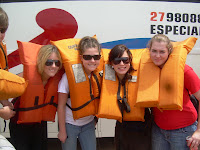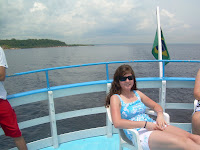
You may wonder why the men don't do this job. I learned that a women's value is determined by her hard work. If a man is seen carrying the water then it is concluded that the wife is lazy and stupid. Even after a women has given childbirth she is expected after 1-2 weeks to continue her daily task. However, when a women is seen making this trek she is viewed by the villagers as intelligent and valuable (Rosenberg, 5).
You can imagine the consequences of not having a mother around. In this small village in Ethiopia it is common to see 4 year-old children taking care of their little brothers and sisters! Some children do help to go and find water but only unitl the age of 7 or 8. After that, villagers will assume the wife is lazy and laying unneeded burdens on her children. However, little girls start their career's young. Many girls have to drop out of school as young as 8 to help carry water to sustain their families (Rosenberg, 6).
Did you know that 900 million people don't have access to clean water?! How often do I take for granted my faucet every morning which provides me with clean water, even if it wont ever get cold?! Also, 2.5 billion people have no safe way to dispose human waste. Instead human waste is deposited in fields and rivers! In consequence, 3.3 million people die from dirty water and lack of hygenie every year. Sadly, most deaths are of children under the age of 5 (Rosenberg, 7)!
Furthermore, the little money that these people have is spent on visits to the doctor to clear out pestisides and diarrhea. 70% of patients that are treated in this Ethiopian village suffer from waterborne diseases. In consequence, they do not have enough money to even buy soap (Rosenberg, 8)!
So what can be done??
One thing that can be done is construction of wells. Merz, Nakarmi, and Weingarther have been investigating this process. A potential problem to wells that they have found is that water found close to the ground is often contaminated. They are currently in the process of constructing ways to get water deeper in the earth. A second solution they have found is called fog collection. However, again it is difficult for people to depend on fog for all of their water (Juerg, 17).
A third solution is to teach them propper farming techniques. S. F. Tyrell has been researching different ways to purify water. Tyrell has come up with a system called the "Solid-Based Recirculation System". He experimented with this by applying equal amounts of dirty water to 3 different land planes. Next, he applied his treatment to the different planes. There was a 90% removal of pollutants. If the people in these villages could be taught propper farm mechanisms then the little water that they have could be purified. This in return could decrease the amount of deaths by providing clean water (Tyrell, 75).
Furthermore, there are many organizations trying to help these people filter their water. Namely, A Glimmer of Hope, CARE, WaterAid, and Water. org are fundamental organizations. There goals are to install latrines to keep fields clean and sanitary. Also, they are working on building dams to save what little water can be used.
However, is there anything else that we can really do? One great thing is to volunteer to make sanitary kits. If the people of Ehiopia had soap to clean, the result could be substantial. Kits would also provide towels, napkins, and toliet paper. If we took a little bit of our time and money to put together these kits we could truly make a difference.
Finally, perhaps the best thing we can do is to be grateful and recognize our blessings. I have been given so much. When I find myself complaining I am going to try and remember these people who live such difficult lives and remember all that I have been given.
citations:
Merz, Juerg. "Potential Solutions to Water Scarcity." Mountain Research and Development. 23. (2003): 14-18. Print.
Rosenberg, Tina. "The Burden of Thirst." National Geographic. December 2008: 1-8. Print.
Tyrell, S.F. "Treatment of Dirty Water." Water Science Technology. 51. (2005): 73-79. Print.














